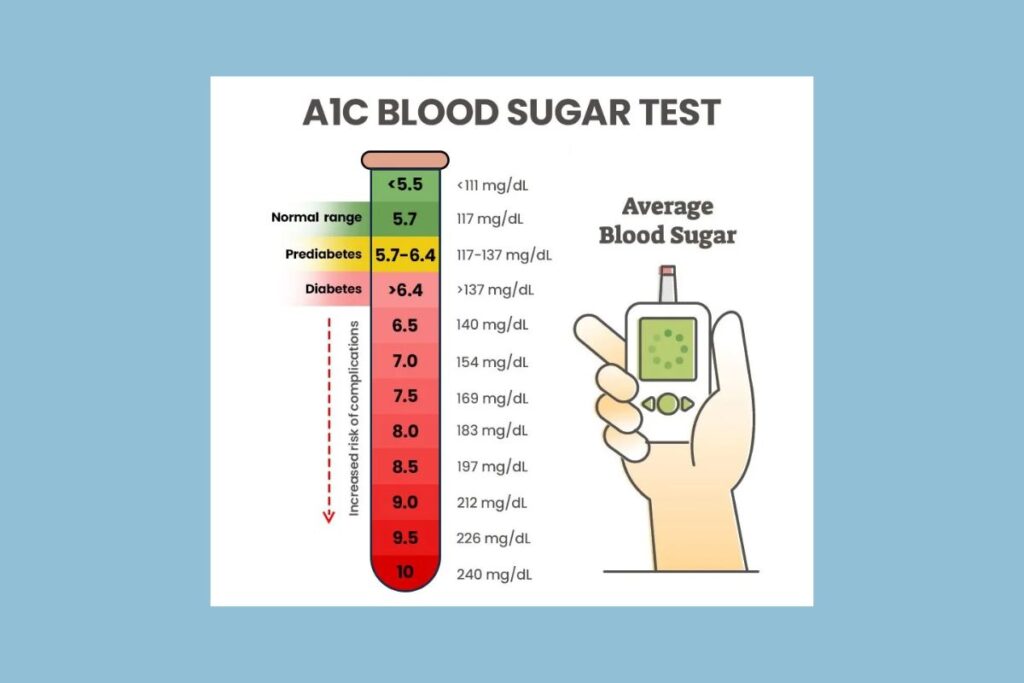Ozempic is typically considered when other treatments haven’t effectively lowered A1C levels. Generally, an A1C level of 9% or higher may indicate eligibility for Ozempic treatment. Managing diabetes involves understanding key health metrics, and one of the most important indicators is your A1C level.
This number gives an overview of your average blood sugar levels over the past two to three months, making it a crucial part of diabetes care. However, this is a general guideline, and your healthcare provider will consider individual factors like health history and treatment goals.
A1C and Diabetes Management
A1C (Hemoglobin A1C) is a blood test that measures the average blood sugar (glucose) levels over the past 2 to 3 months. It reflects the percentage of hemoglobin (a protein in red blood cells that carries oxygen) coated with sugar (glycated). It simply provides an overview of average blood sugar levels. A1C is crucial for diabetes care.
The Ideal A1C Range for Diabetes Management
Managing diabetes requires maintaining a specific A1C target range. While the ideal A1C can vary, most medical organizations agree on a general target range.
- American Diabetes Association (ADA): Aims for an A1C of 7% or lower for most adults with type 2 diabetes.
- International Diabetes Federation (IDF): Suggests a target of 6.5% to 7% for optimal diabetes control. Depending on individualized care, older adults or those with other health conditions may have slightly higher targets.
Staying within this range helps prevent complications associated with diabetes, like heart disease and kidney problems. Regular A1C checks allow you and your healthcare provider to adjust your treatment plan.
How Does Ozempic Work to Lower A1C?
Ozempic is more than just a medication. It’s a powerful ally in managing blood sugar for people with type 2 diabetes. Helping control your A1C reduces the risk of diabetes-related complications.
- Mechanism of action: Ozempic mimics a hormone called GLP-1 (glucagon-like peptide-1), which helps your body release insulin when blood sugar levels rise.
- Reduces blood sugar levels: It works by slowing down the speed at which food moves through your stomach, helping control hunger and improving blood sugar control.
- A1C reduction: In clinical trials, Ozempic has been shown to lower A1C by an average of 1.5% to 2%.
- Additional benefits: In addition to lowering blood sugar, Ozempic can help with weight loss, contributing to better diabetes management.

A1C Levels and Eligibility for Ozempic Treatment
Ozempic is a popular medication for managing type 2 diabetes. Your A1C level is critical in determining Whether You Are suitable for it.
- Eligibility based on A1C levels: Ozempic is typically recommended for people with an A1C of 9% or higher when lifestyle changes and other medications aren’t enough.
- Individualized treatment: Your doctor may adjust the A1C target based on your health history and specific needs.
- Comprehensive approach: A healthcare provider may suggest Ozempic if other methods, such as diet and exercise, have not provided enough A1C reduction.
Other Factors That Influence Ozempic Eligibility
Your A1C is just one factor in determining whether Ozempic is right for you. Your doctor will evaluate other factors to create the best treatment plan.
- BMI: Ozempic may be recommended for people with a high body mass index (BMI), as it can help them lose weight.
- Coexisting conditions: Ozempic may offer additional benefits if you have heart disease, kidney issues, or other complications.
- Age: Depending on their medication tolerance, older adults may need more tailored treatment plans.
- Lifestyle and diet: A healthy diet and regular physical activity can enhance the effects of Ozempic, contributing to better blood sugar control.
Realistic Expectations: What A1C Reduction Can You Expect from Ozempic?
Ozempic can be highly effective in reducing A1C levels (hemoglobin A1c). However, it’s essential to have realistic expectations. Let’s examine it more closely.
- Typical A1C reduction: Ozempic has been shown to lower A1C by 1.5% to 2% on average in clinical trials. However, this varies depending on your starting A1C and other health factors.
- Weight loss impact: Many users experience weight loss with Ozempic, which can improve blood sugar levels and A1C.
- Time frame: It may take several weeks or months of consistent use to see the full benefits of A1C reduction.
- Monitoring progress: Regular A1C tests will help you track your progress and adjust your treatment as needed.
Choosing Ozempic as part of your diabetes management plan depends on several factors, including your A1C level. By understanding how A1C works and what level qualifies for Ozempic, you can make informed decisions with your healthcare provider. Remember, achieving the right A1C target takes time, consistency, and a comprehensive approach. Stay proactive in managing your diabetes, and take the following steps toward a healthier future with the proper treatment!
Conclusion:
If you’re considering Ozempic for diabetes management, consult our board-certified physicians at Fat Off Clinic in Las Vegas, NV.
Our experienced team can assess your needs, discuss your A1C levels, and determine the most appropriate treatment plan. Schedule a consultation today and take the first step towards a healthier future.



